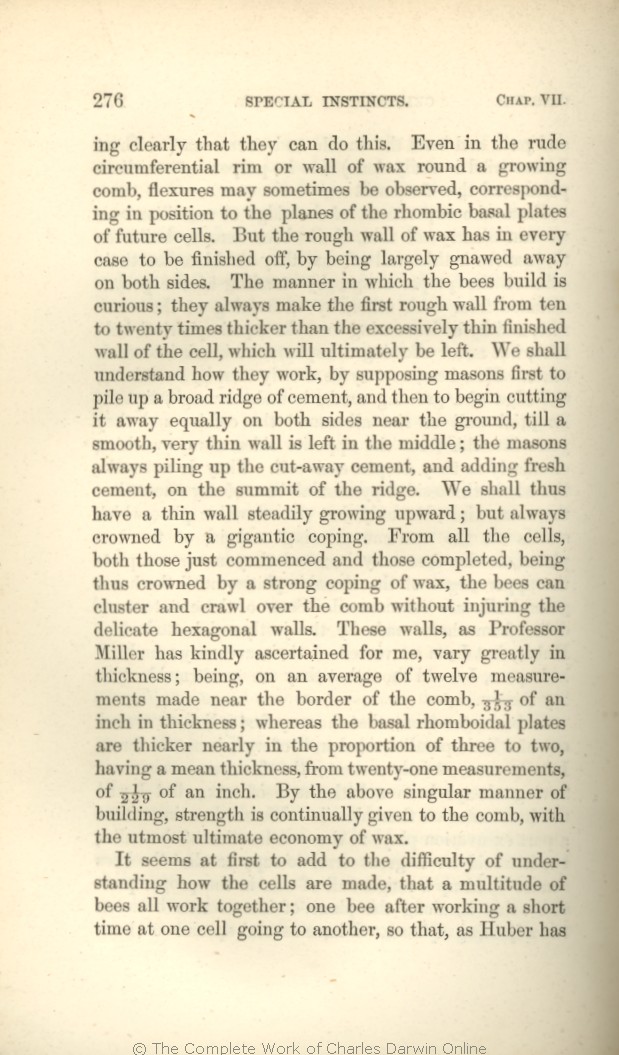clearly that they can do this. Even in the rude circumferential rim or wall of wax round a growing comb, flexures may sometimes be observed, corresponding in position to the planes of the rhombic basal plates of future cells. But the rough wall of wax has in every case to be finished off, by being largely gnawed away on both sides. The manner in which the bees build is curious; they always make the first rough wall from ten to twenty times thicker than the excessively thin finished wall of the cell, which will ultimately be left. We shall understand how they work, by supposing masons first to pile up a broad ridge of cement, and then to begin cutting it away equally on both sides near the ground, till a smooth, very thin wall is left in the middle; the masons always piling up the cut-away cement, and adding fresh
cement, | cement, 1859 1860 1861 1866 | | cement 1869 1872 |
| upward; 1859 1860 1861 1866 | | upward 1869 1872 |
| walls. 1861 1866 1869 1872 | | walls, 1859 1860 |
| ..... 1861 1866 1869 1872 | | which 1859 1860 |
| ..... 1861 1866 1869 1872 | | are 1859 1860 |
| ..... 1861 1866 1869 1872 | | only 1859 1860 |
| ..... 1861 1866 1869 1872 | | about 1859 1860 |
| ..... 1861 1866 1869 1872 | | one 1859 1860 |
| ..... 1861 1866 1869 1872 | | four-hundredth 1859 1860 |
| ..... 1861 1866 1869 1872 | | of 1859 1860 |
| ..... 1861 1866 1869 1872 | | an 1859 1860 |
| ..... 1861 1866 1869 1872 | | inch 1859 1860 |
| ..... 1861 1866 1869 1872 | | in 1859 1860 |
| ..... 1861 1866 1869 1872 | | thickness; 1859 1860 |
| ..... 1861 1866 1869 1872 | | the 1859 1860 |
| ..... 1861 1866 1869 1872 | | plates 1859 1860 |
| ..... 1861 1866 1869 1872 | | of 1859 1860 |
| ..... 1861 1866 1869 1872 | | the 1859 1860 |
| ..... 1861 1866 1869 1872 | | pyramidal 1859 1860 |
| ..... 1861 1866 1869 1872 | | basis 1859 1860 |
| ..... 1861 1866 1869 1872 | | being 1859 1860 |
| ..... 1861 1866 1869 1872 | | about 1859 1860 |
| ..... 1861 1866 1869 1872 | | twice 1859 1860 |
| ..... 1861 1866 1869 1872 | | as 1859 1860 |
| ..... 1861 1866 1869 1872 | | thick. 1859 1860 |
| thicker 1861 1866 1869 | | thicker, 1872 |
| the above 1861 1866 1869 1872 | | this 1859 1860 |
|
|
It seems at first to add to the difficulty of understanding how the cells are made, that a multitude of bees all work together; one
be | be 1866 | | bee 1859 1860 1861 1869 1872 |
|









